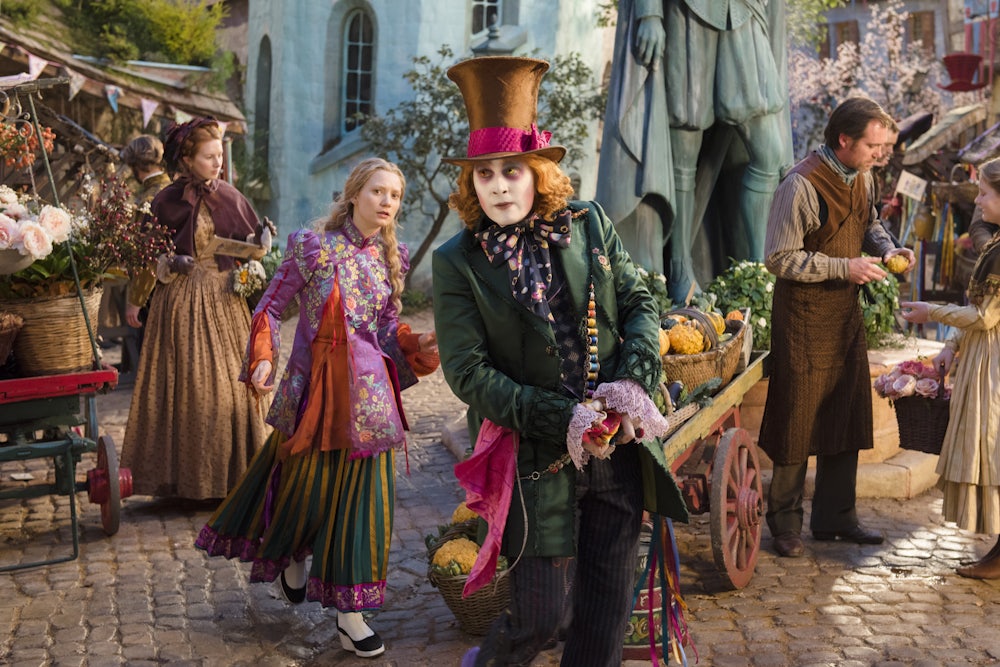The late Gene Siskel used to say that whether or not a movie was good could be determined by a simple test: Is the movie more interesting than a documentary of the actors having lunch? I never quite understood this calculus—it’s possible Gene Siskel had more interesting lunches than I do—so a better test for me is whether the actors on screen seem to be enjoying themselves, are they engaged? Making movies, appearing on screen to be adored, getting to play make believe for a living, it’s the dream for millions of people, and these are the special few who get to live it. Actors should be enjoying themselves up there, or at least finding themselves challenged. Act like you mean it.
I don’t remember the last time I saw actors more dispirited and bored than in Alice Through the Looking Glass. The sequel to 2010’s Alice in Wonderland—a movie that made a bunch of money, but is remembered by few and beloved by no one—feels as obligatory and perfunctory as any movie I can recall in years. No one looks like they want to be there, no one is quite sure what they’re supposed to be doing, no one appears to have shown up for anything more than a paycheck and some extra time in the trailer reading scripts for movies they’d much rather be doing. It’s a movie no one asked for that never works up the energy to justify its existence. Everyone on set just wants to go home. You’ll share their urgency.
Mia Wasikowska is back as Alice, now a grown-up ship captain who gets called back to Neverland because the Mad Hatter (Johnny Depp) has fallen into despair because none of his friends believe him that his parents are still alive. Alice decides, as one does, to go back in time to prevent their deaths to cheer him up, encountering Time himself in the person of Sasha Baron Cohen, doing an extended Werner Herzog impression for reasons known only to Sasha Baron Cohen. (It was a relief, after the screening, to realize I was not the only person who noticed this.) The gimmick for this movie is time travel, the last refuge of the desperate sequel. The whole gaggle is back from the last film, from Anne Hathaway to Helena Bonham Carter to the Cheshire Cat and the March Hare. All of them, including the CGI characters, look bored.
The story is rote and grinding, and this time, there isn’t even as much visual flair. In the first film, Tim Burton at least brought with him his old weirdness, as familiar as it has become by now. Director James Bobin, who was so fun in the two recent Muppet movies, is completely overwhelmed by the proceedings here, giving the movie no rhythm or forward propulsion; the movie just sort of flops around, waiting to get started until it finally begins to wait to end. The movie is also devoid of both jokes and whimsy, a problem when the whole set design is built to surround both. You just watch people loaf around a CGI set for 100 minutes, hoping you’re watching the movie in 3-D because that means you just gave them four dollars or so more than you necessarily had to.
Forgive my lack of spirit here: We rise to the level of our challenges, and it’s disorienting to realize a 800-word review of a movie might require more effort to create than the movie it is ostensibly attempting to chronicle required to complete. So let’s talk about Johnny Depp for a second. The problem with Depp is not simply roles like the Mad Hatter, not anymore; his “quirkiness” has never felt more calculated and mirthless than here, but we’ve all been getting used to that for a while. The problem is that he can’t get away from this pose of remove anymore. His non-fantastical performances—Black Mass, Transcendence, Mortdecai—are now as cartoonish as the Mad Hatter or Captain Jack Sparrow. He no longer resembles a human being on screen, or even a facsimile of one. He’s just in an airless room, alone, only to be watched behind glass. Alice Through the Looking Glass isn’t offensively bad, or some sort of glorious disaster. Like Depp, it’s just empty and sad and tired. It’ll make you feel the same way. It’ll make you think being a movie star might be the worst job in the world until you realize: Hey, they’re not the ones who have to watch this.
Grade: D
Grierson & Leitch write about the movies regularly for the New Republic and host a podcast on film, Grierson & Leitch. Follow them on Twitter @griersonleitch or visit their site griersonleitch.com.
